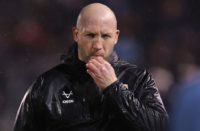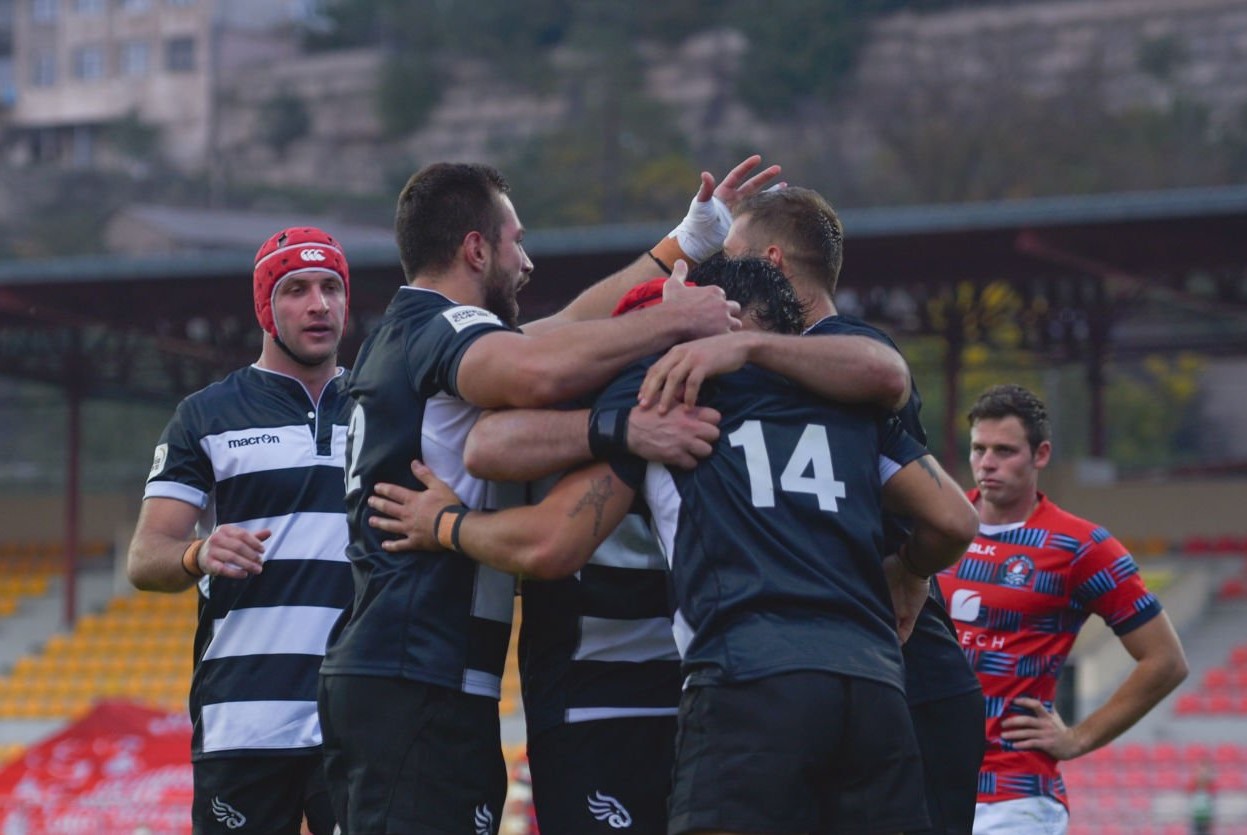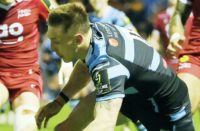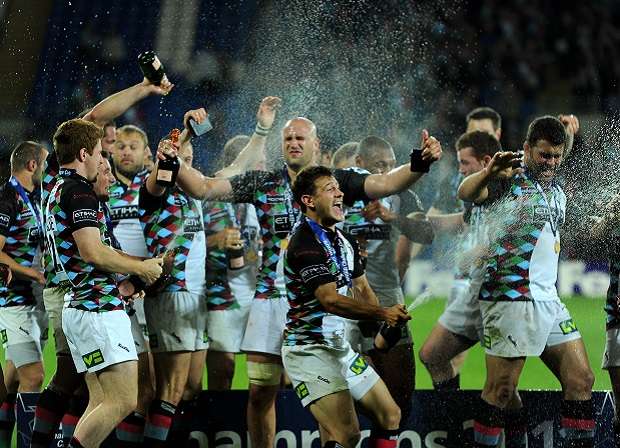 The Challenge Cup in its many guises has been good to Harlequins and vice versa. Quins have won Europe's second tier Cup competition a record three times with the power to add another next Friday night in Lyon and those victories have proved both important staging posts and launching pads in the club's professional evolution.
The Challenge Cup in its many guises has been good to Harlequins and vice versa. Quins have won Europe's second tier Cup competition a record three times with the power to add another next Friday night in Lyon and those victories have proved both important staging posts and launching pads in the club's professional evolution.
In the early days, when Quins failed to set the Premiership alight and underperformed in the Heineken Cup, their successful forays into the Challenge Cup provided the essential silverware needed to keep supporters and backers happy. Later, an absolutely stellar campaign in 2010-11 helped heal the post Bloodgate wounds and the momentum built from that run launched Quins into their 2011-12 Premiership-winning season.
And Quins badly need to bounce back from yesterday's massive home defeat against Exeter to both qualify for next season's Champions Cup and to ensure the Conor O'Shea era finishes on the positive note it deserves. With their 150th anniversary next season Quins want to be dining at the top table of European Rugby.
Harlequins' first ChallengeCup – then called the Shield – came in 2001 after the most confusing and disjointed of seasons. Their Premiership form was poor in the extreme and Zinzan Brooke was replaced as coach on New Year's Day when CEO Mark Evans, the former Saracens coach, took control of the team. Their fortunes didn't improve much in the Premiership – they eventually finished 11th – but because Rotherham were so way off the pace, 26 points behind Quins, there was never any danger of relegation.
The upside of that was a freedom to try and salvage the season by throwing the kitchen sink at the two cup tournaments their still strong squad were contesting. They were to be denied by Newcastle Falcons in the Tetley's Bitter Cup final, losing 30-27 in front of a 71,000 crowd, but went one better in the European Shield competition.
Their entire campaign had a French tinge. In the Pool they had to get past Perigueux and Dax as well as Ebbw Vale before a high quality win at Brive in the quarter-finals against opponents who had inflicted a painful defeat a few years earlier in a classic Heineken Cup encounter. Tries from Will Greenwood and flanker Steve White-Cooper did the trick and then Quins had the pleasure of redressing the balance against Newcastle in the semi-final, emerging 17–12 winners at Headingley.
That semi-final triumph over the Falcons was possibly Scotland fly-half Craig Chalmers' finest hour at Harlequins after he came in for Paul Burke, who was out with a broken hand, and scored all 17 points with a try, conversion, three penalties and a drop-goal.
The final, held at the Madejski Stadium in Reading, was a wildly fluctuating contest which was rather fitting given the season Quins had endured. Narbonne, with Pumas legends Ignacio Corleto and Mario Ledesma to the fore, were formidable opposition, and it was helter-skelter stuff with the score 26–26 after 80 minutes. Thereafter Quins drew ahead in extra-time with Paul Burke enjoying another prolific afternoon by scoring 27 points from his boot, while there were tries for Ben Gollings, Pat Sanderson and Daren O'Leary.
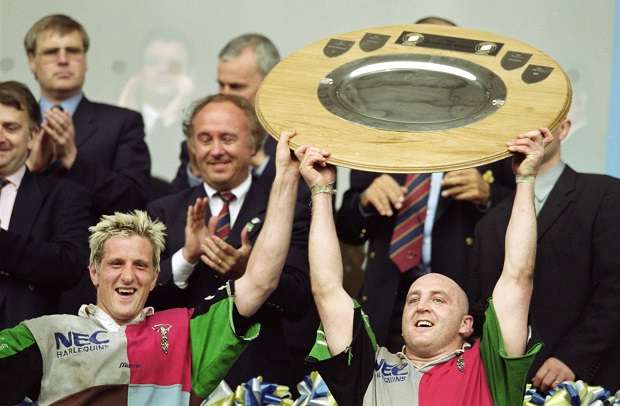 Victory was tinged with sadness, though, when Wallaby flanker David Wilson suffered a serious knee injury in extra-time. It looked bad and ultimately proved career-ending for the Quins skipper, who might have been 34 but was playing very well and had a couple more seasons in his legs. To lose him, just when the club were beginning to build some momentum, was a huge blow.
Victory was tinged with sadness, though, when Wallaby flanker David Wilson suffered a serious knee injury in extra-time. It looked bad and ultimately proved career-ending for the Quins skipper, who might have been 34 but was playing very well and had a couple more seasons in his legs. To lose him, just when the club were beginning to build some momentum, was a huge blow.
“The truth is we weren't a good enough or consistent enough team then to challenge for the Premiership,” recalls Ireland and Lions hooker Keith Wood. “But we had plenty of talent and when the force was with us and the stars aligned we could be very good and formidable opponents. That tended to make us a very dangerous Cup team.”
Quins were at it again three years later beating a very tough and nuggety Montferrand team in the final – the French team changed their name to Clermont Auvergne the following season. After qualifying easily from their Pool, Quins again showed their mettle in the knock-out stages with a thumping 41–8 win over old rivals Brive in the quarter-final and a hard-fought 31–22 semi-final victory over Connacht – another perennial rival in Europe over the coming years.
Come the final, Montferrand were mighty opponents – one of the best teams Harlequins had ever faced in Europe – but on this occasion, captained by Springbok Andre Vos, the Quins were inspired and not cowed by the occasion, emerging 27–26 winners. Full-back Gavin Duffy and wing Simon Keogh scored the tries, while Paul Burke slotted four penalties and his replacement, Andy Dunne, also added a penalty and a conversion to complete a fine win and add more silverware to the Harlequins trophy cabinet.
In truth, however, success in the European Shield had papered over a lot of cracks at the club, which still had not fully adapted to the day-to-day realities of professionalism.
The most important of Quins' three titles was undoubtedly the most recent in 2011 when the club emerged from the shadow and ignominy of Bloodgate, their 2009 Heineken Cup quarter-final scandal against Leinster – to give the rugby world something else to talk about.
An exciting young team full of England prospects playing an excellent, easy on the eye, brand of rugby.
In the Premiership during that first full season under O'Shea Quins didn't tear up any trees, they weren't quite ready for a Championship title, but they were on a steady upward curve and could be very competitive on their day. With no realistic shot at the Premiership, but with no relegation worries either, Quins were free to empty the tanks in Europe which they did in impressive style.
They qualified from a Pool containing Connacht, Bayonne and Cavalieri which set up a wonderfully compelling road to the final, which in short order saw Quins tackle European giants Wasps, Munster and Stade Francais with whom they had clashed so memorably in the Heineken Cup on a number of occasions. This was the season that Wasps, Munster and Clermont joined the competition at the quarter-final stage after failing to reach the knock out stages of the Heineken Cup.
As if those high-profile games against Europe's elite were not incentive enough, they also offered a chance for England hopefuls in the Quins ranks to stake their claim for inclusion in Martin Johnson's 2011 World Cup squad.
First up was Wasps at the Stoop, where 22 points from the boot of Nick Evans and tries from Danny Care and Maurie Fa'asavalu heralded an impressive 32–22 win. But then came the big one, an away semi-final against Munster at Thomond Park, the graveyard for so many in Europe.
This was a key match for Quins in so many ways – a rite of passage for a young team – but if they could leave Ireland with a win then it would in a strange way draw a line under Bloodgate. A pure and simple rugby story and triumph.
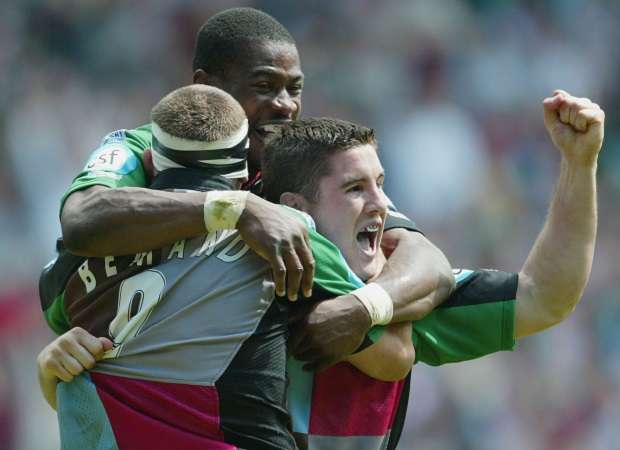 In front of a capacity 26,000 crowd at Thomond Park in warm weather, Quins aggressively took the game to Munster with two first-half tries from Danny Care and George Robson and there could have been two or three other scores before the break.
In front of a capacity 26,000 crowd at Thomond Park in warm weather, Quins aggressively took the game to Munster with two first-half tries from Danny Care and George Robson and there could have been two or three other scores before the break.
Meanwhile experienced Fa'asavalu, an often underestimated figure during his time at Quins, produced a monstrous game and took great delight not only in tackling Ronan O'Gara as hard and as often as possible but running at and through the Munster fly-half when he had ball in hand. O'Gara was Munster's key man and Quins wanted to unsettle him – the special attention shown to him was a huge compliment of sorts although ROG possibly didn't appreciate it at the time.
Munster did hit back with a Felix Jones try and had an effort from Doug Howlett disallowed for a forward pass as the nerves started to jangle, but a brace of penalties from replacement Rory Clegg saw Quins home 20-12. At the time it was only the second occasion that Munster had been defeated at Thomond Park in either European tournament.
“That was a huge win for us a team,” recalls Robshaw. “As Conor said in the changing room afterwards, we had that in our locker forever. Wins like that change your entire mindset. If you can beat Munster at Thomond in Europe, you are capable of beating anybody. It doesn't mean to say you will, you still have to put all the hard work in, but after winning at Munster you know big results and titles are possible. I always look back on the win at Thomond and then taking the cup against Stade a few weeks later as the foundations of our Premiership title the following season. No question.”
Quins victory over Stade Francais at Cardiff City Stadium in the final was a tense, much less expansive affair, and Quins had to keep their cool and come from behind at the death with a late score by Argentinian Gonzalo Camacho. The try put Quins 17–18 behind with a touchline conversion to follow, but Nick Evans had been signed for precisely these moments and sent the ball soaring through the posts with a minimum of fuss.
Quins had won their third European Challenge Cup, but this time it really did feel like it might be the start of something even bigger. It was.


